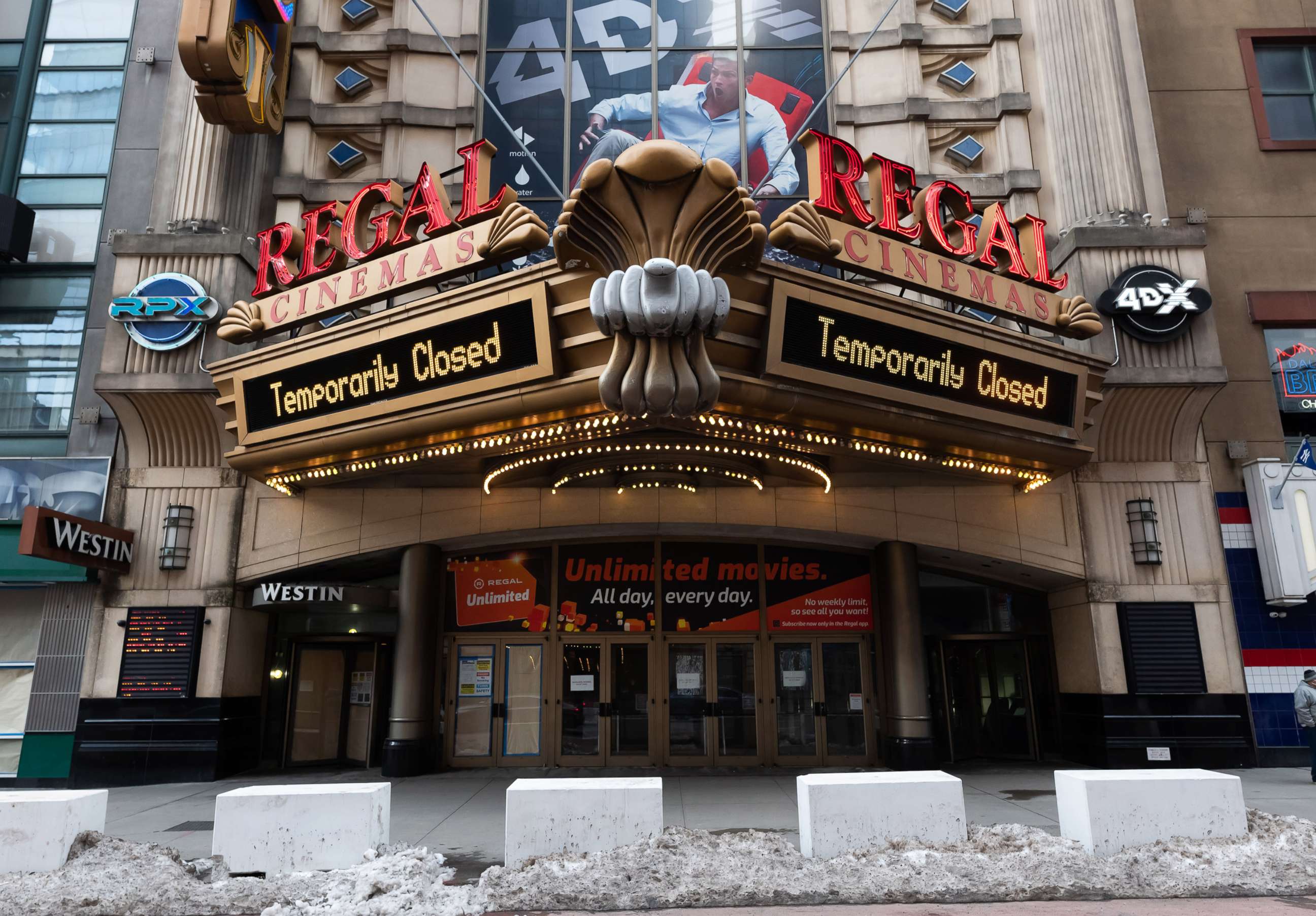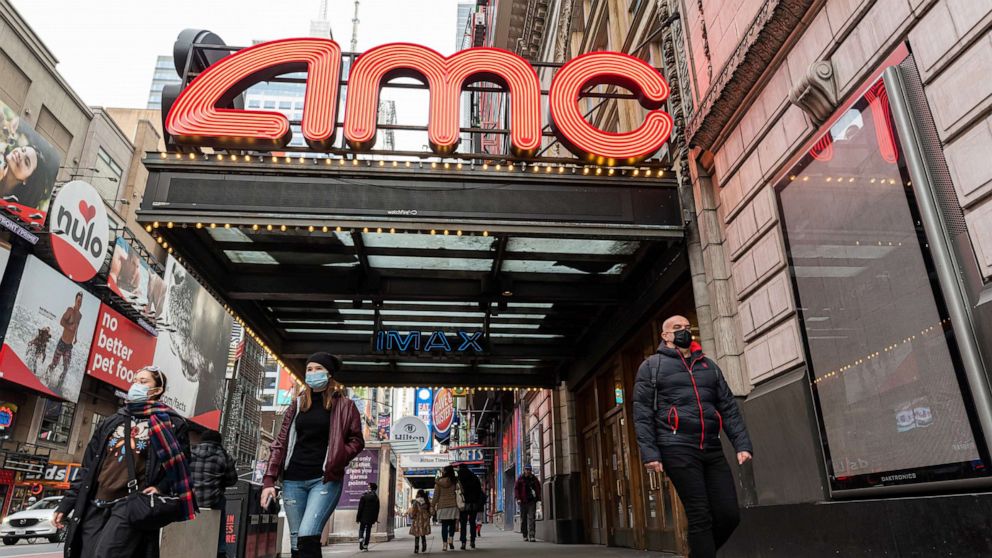What movie theaters may look like in a post-COVID world
The film industry was devastated due to the COVID-19 pandemic in 2020, but brighter days may be ahead for moviegoers and theaters.
Patrick Corcoran, vice president and chief communications officer for the National Association of Theater Owners (NATO), told "Good Morning America" about the "huge" thing coming to the rescue of movie theaters as we head into 2021.
Who the Save Our Stages Act will help
The Save Our Stages Act, a bipartisan effort led by John Cornyn, a Republican senator from Texas, and Amy Klobuchar, a Democratic senator from Minnesota, among others, includes $15 billion to assist independent music venues, movie theaters and other cultural institutions.
These businesses, most of which have largely been closed since March 2020, will be able to apply for grants to cover six months of payroll, rent, utilities and personal protective equipment without adding to their debt, as would have been the case with loans.
"What this stimulus program does is, for those who are in small and mid-sized companies that have been most affected, it gives them a bridge until we can reopen normally," Corcoran said.
Without this aid, NATO estimated that 70% of mid-size and smaller movie theaters in the U.S. could have filed for bankruptcy or closed permanently within months, resulting in more than 70,000 jobs potentially being permanently lost.
The Save Our Stages Act -- a part of the recently passed $900 billion stimulus relief bill -- does not include funding for bigger entities, such the AMC or Regal chains.
Corcoran explained that these bigger companies often have access to capital or lines of credit to keep themselves going in dire times while smaller and mid-sized businesses often do not. That said, he called what has happened to the film industry at large a "big blow," adding that "everybody's hurting."
Movie theaters will be able to reopen in the spring, Corcoran estimated, but that it all depends on the rollout of COVID-19 vaccines, seeing the number of cases go down, the general population's overall motivation and comfort level to return to cinemas, and having films people actually want to see playing.

Battle of the platforms: theatrical vs. streaming
Despite fears that the pandemic combined with the rise in streaming services could spell disaster for movie theaters, Corcoran doesn't think they're going away anytime soon.
"The biggest thing is external right now, with the pandemic and people being worried about gathering with a lot of people. When that concern goes away, people really like going to the movies," he said. "There is something different, something especially powerful about seeing something at that scale with other people, with strangers."
Corcoran also pointed to the yearly domestic box office totals -- which have surpassed $10 billion since 2009 and topped more than $11 billion since 2015 -- as proof that films are doing just fine in theaters. He noted that theaters have competed with different forms of media throughout the years, from television to VHS and DVDs to streaming.
The pandemic has posed the biggest threat to the film industry, with the latest Comscore numbers showing a domestic box office total of around $2.7 billion. This figure is roughly 80% down from the 2019 domestic box office total.
The biggest pre-COVID movie of the 2020 -- and the No. 1 film of the year in the U.S. -- was "Bad Boys for Life," released Jan. 17 and grossing just over $204 million at the domestic box office. The top domestic film released amid COVID, "Tenet," which arrived Sept. 3 after multiple delays, came in at No. 14 for the year and grossed just over $46 million.
While many films were moved to 2021 and beyond, shifting entire slates in the process, some studios decided to release some of their films on streaming. For example, Disney dropped "Onward," "Hamilton" and "Soul" for all Disney+ subscribers while offering "Mulan" and the upcoming "Raya and the Last Dragon" for an additional premium fee.
These days, streaming poses the biggest threat to the traditional moviegoing experience, but Corcoran believes the two "can coexist extremely well."
"They work very well together and they feed each other," he said. "Studies show that people who were the most avid streamers are also the people who go to the movies the most, so people who like movies like them wherever they can get them."

The Warner Bros. and HBO Max of it all
When Warner Bros. announced in Dec. 2020 that it would debut its entire 2021 slate on HBO Max, the same day the films release theatrically, many wondered what the fallout would be. However, Corcoran, who acknowledged that it "made a lot of noise," said that it's not necessarily predictive of how studios will operate in the future.
"It also had the effect of really kind of angering most of Hollywood -- both their production partners and the artists that make their movies were very upset about the way it was handled and what the decision was," he added.
Movie theater chains, which did not respond to ABC News' request for comment, aren't fans of the news either.
AMC revealed in an SEC filling just days after the studio's HBO Max move that they would likely run out of money in January 2021 if they don't receive additional cash flow, saying their "challenges have been exacerbated" by Warner Bros.'s plan and explaining their worries that it "may result in other studios adopting a similar strategy."
Regal, which is owned by Cineworld, spoke out after Warner Bros. opted to put "Wonder Woman 1984" on HBO Max -- prior to their overall 2021 reveal -- by acknowledging the current difficulties of planning theatrical releases but expressing their hopes for working with the studio when the pandemic lifted. “Big movies are made for the big screen and we cannot wait to reopen our cinemas in Q1 in order to offer our customers, as always, the best place to watch a movie," a spokesperson said in a statement.
Corcoran called the move "a little disappointing" given the fact that Warner Bros. are looking at the whole calendar year as opposed to expecting things to return to normal in the spring.
He explained, "We don't think it's going to take that long and we expect that, once theaters are back up and running and once there's a lot of movies in the marketplace, you'll see changes in the way those studios that have announced changes to their business will go back to ways they've done it before because, frankly, they just make too much money in theatrical space."
Disney is the parent company of ABC News and "Good Morning America."




